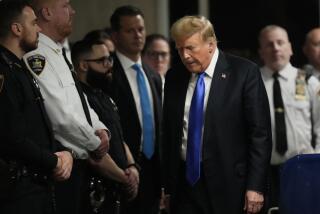THE NORTH VERDICT : Weary Jurors Reveal Little of How Decisions Evolved
- Share via
WASHINGTON — After a two-month trial and 64 hours of intense deliberations, the 12 ordinary Americans who convicted Oliver L. North of three felony charges Thursday seemed to want nothing so much as to put their extraordinary experience behind them.
“Right now, all I want to do is catch the next plane to Jamaica,” weary juror Jean I. Johnson told reporters after federal marshals escorted her from the camera-encircled federal courthouse to her modest Washington home.
Johnson, a 53-year-old cashier who had won a place on the jury after she told the court “I’m not into politics,” refused to disclose what had transpired during 12 days of debate in an isolation so complete that there were no windows in the jury room and those in the courtroom covered over with paper. When not deliberating at the U.S. courthouse here, the jurors were sequestered in a downtown hotel, sealed off from all outside contact.
‘Bickering, Arguing’
Another juror, unemployed security guard Earl F. Williams, told reporters that the panel did a “lot of bickering and arguing” during the nearly two weeks they spent pondering the intricate case.
Their vote for conviction, he said, was accompanied by a “strong prayer.”
“It was tough to come up with a decision,” the 65-year-old Williams said.
None of their colleagues who were immediately available would provide further clues about the course of decision making. As a result, while some legal experts said that the decision to convict North on three counts and acquit him on nine others appeared to represent a compromise among conflicting viewpoints, the comments of available jurors shed no light on that question either way.
The every-day backgrounds of the nine women and three men on the jury stood in marked contrast with the famous and once-powerful figures at the center of the North trial--the top officials of the White House national security apparatus during the Ronald Reagan Administration.
‘Don’t Like News’
The jury foreman, 34-year-old hospital secretary Denise Anderson, had told the court before the trial: “I don’t like the news. I don’t like to watch it. It’s depressing.”
Retired bus driver Caswell Hartridge said that he “didn’t understand” what he had heard about the Iran-Contra scandal.
“I’m not that sure that was a jury of his peers,” complained Rep. Henry J. Hyde (R-Ill.), a staunch North defender. A prosecution witness, Rep. Lee H. Hamilton (D-Ind.), said that he had been concerned about the impact the trial’s “difficult, complicated testimony” might have on the jury.
But the jurors themselves, dropped off at their homes by a siren-wailing six-car motorcade, spoke of priorities that had nothing to do with the public controversy.
“I’m tired, “ said Ernest Nelson, a 30-year-old telecommunications technician, in a brief interview, “and I’m trying to relax. I just want to spend time with my family, because I missed them all very, very much.”
Staff Writer Michael Shear contributed to this story.
More to Read
Sign up for Essential California
The most important California stories and recommendations in your inbox every morning.
You may occasionally receive promotional content from the Los Angeles Times.













